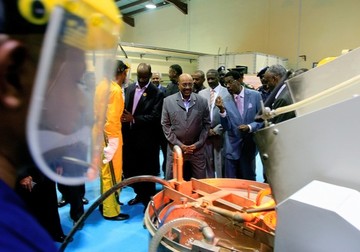Sudan expects to increase gold production to 150 tonnes, worth $8 billion
February 21, 2013 (KHARTOUM) – The Sudanese minister of minerals, Kamal Abdel-Latif, said on Wednesday that he expects the country’s gold production to jump to 150 tonnes, thus generating $8 billion in revenues.

The government eyes gold output of around 50 tonnes in 2013, worth around $2.5 billion, which would potentially make it Africa’s third largest gold miner behind South Africa and Ghana, and push it into the top 15 producers globally.
Abdel-Latif disclosed that the proven gold reserves in Qbgbih field are close to 66 tonnes, adding that the government is working on a comprehensive survey to detect potential spots of mineral wealth throughout the country.
This survey would target an area of one million square kilometres through partnerships with foreign companies.
The Sudanese official said that the government had established a $70 million mining centre while expanding the work of Ariab Mining Company (AMC) with a funds injection of $90 million. Jointly owned by the Sudanese government and a Canadian firm, AMC currently runs Sudan’s largest gold mine.
He added that 13 out of 19 companies have entered the production phase, while 40 others saw their licences revoked “for lacking seriousness”.
The East African country is looking for gold to make up for the budget deficit it incurred as a result of losing three quarters of its oil production due to the secession of South Sudan in July 2011.
In recent years a growing number of foreign gold companies have expressed interest in obtaining licences to operate in Sudan.
(ST)
